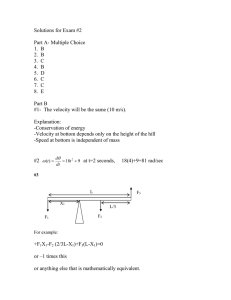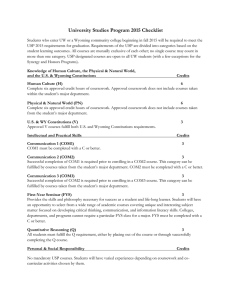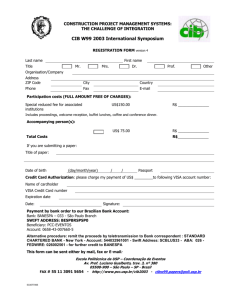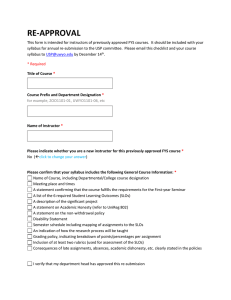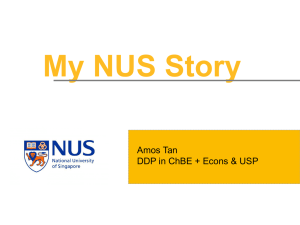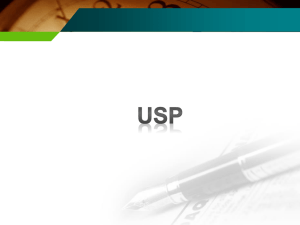V
advertisement
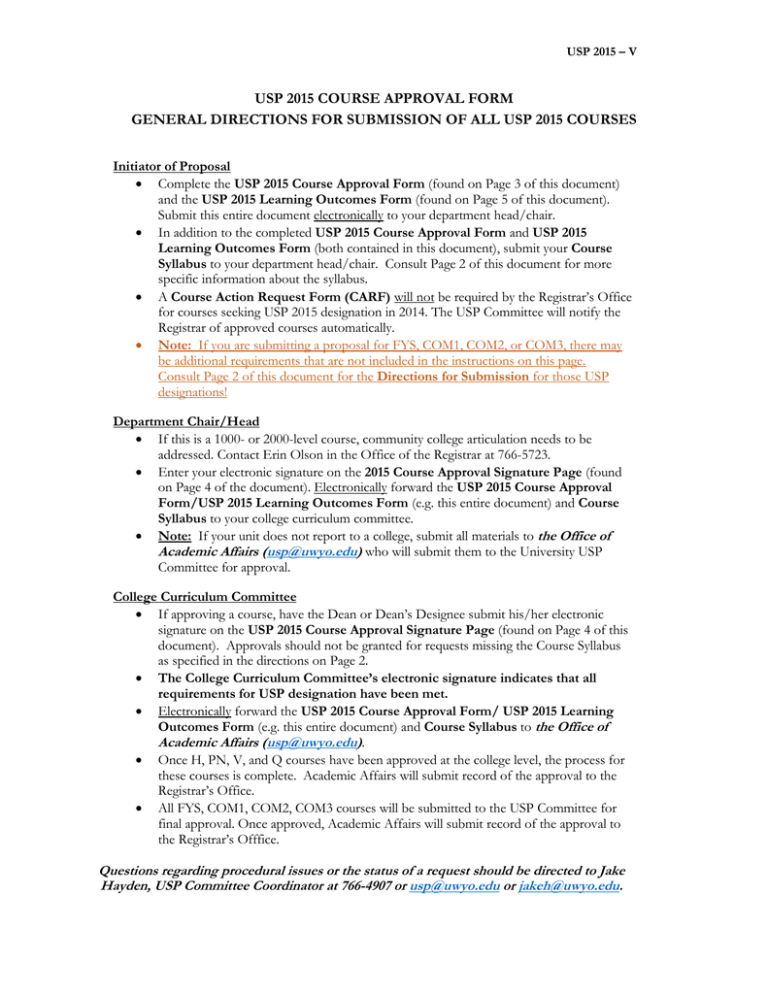
USP 2015 – V USP 2015 COURSE APPROVAL FORM GENERAL DIRECTIONS FOR SUBMISSION OF ALL USP 2015 COURSES Initiator of Proposal Complete the USP 2015 Course Approval Form (found on Page 3 of this document) and the USP 2015 Learning Outcomes Form (found on Page 5 of this document). Submit this entire document electronically to your department head/chair. In addition to the completed USP 2015 Course Approval Form and USP 2015 Learning Outcomes Form (both contained in this document), submit your Course Syllabus to your department head/chair. Consult Page 2 of this document for more specific information about the syllabus. A Course Action Request Form (CARF) will not be required by the Registrar’s Office for courses seeking USP 2015 designation in 2014. The USP Committee will notify the Registrar of approved courses automatically. Note: If you are submitting a proposal for FYS, COM1, COM2, or COM3, there may be additional requirements that are not included in the instructions on this page. Consult Page 2 of this document for the Directions for Submission for those USP designations! Department Chair/Head If this is a 1000- or 2000-level course, community college articulation needs to be addressed. Contact Erin Olson in the Office of the Registrar at 766-5723. Enter your electronic signature on the 2015 Course Approval Signature Page (found on Page 4 of the document). Electronically forward the USP 2015 Course Approval Form/USP 2015 Learning Outcomes Form (e.g. this entire document) and Course Syllabus to your college curriculum committee. Note: If your unit does not report to a college, submit all materials to the Office of Academic Affairs (usp@uwyo.edu) who will submit them to the University USP Committee for approval. College Curriculum Committee If approving a course, have the Dean or Dean’s Designee submit his/her electronic signature on the USP 2015 Course Approval Signature Page (found on Page 4 of this document). Approvals should not be granted for requests missing the Course Syllabus as specified in the directions on Page 2. The College Curriculum Committee’s electronic signature indicates that all requirements for USP designation have been met. Electronically forward the USP 2015 Course Approval Form/ USP 2015 Learning Outcomes Form (e.g. this entire document) and Course Syllabus to the Office of Academic Affairs (usp@uwyo.edu). Once H, PN, V, and Q courses have been approved at the college level, the process for these courses is complete. Academic Affairs will submit record of the approval to the Registrar’s Office. All FYS, COM1, COM2, COM3 courses will be submitted to the USP Committee for final approval. Once approved, Academic Affairs will submit record of the approval to the Registrar’s Offfice. Questions regarding procedural issues or the status of a request should be directed to Jake Hayden, USP Committee Coordinator at 766-4907 or usp@uwyo.edu or jakeh@uwyo.edu. USP 2015 – V PAGE 2 DIRECTIONS FOR SUBMISSION OF U.S. & WYOMING CONSTITUTION (V COURSES) In addition to the completed USP 2015 Course Approval Form and USP 2015 Learning Outcomes Form (both contained in this document), a Course Syllabus must be submitted for review. A Course Syllabus should include the following elements: a) The common/required elements of a course syllabus (UW Regulation 6-809); b) A statement within the course description to indicate that the course fulfills the USP 2015 V requirement (see example statement below); c) The Student Learning Outcomes for V courses that were selected for this course (see Page 5). Example Statement for Syllabus This course fulfills the U.S. and Wyoming Constitutions (V) requirement of the 2015 University Studies Program. Students will demonstrate an understanding of the U.S. and Wyoming constitutions in order to develop the combination of knowledge, skills, values, and motivation to participate and improve the life of our local and global communities. U.S. and Wyoming Constitutions (V) courses will also develop and promote critical and creative thinking skills through active learning, inquiry of pressing issues, and individual and collaborative processing of ideas. Questions regarding how to fill out the USP 2015 Learning Outcomes Form (starting on Page 5) should be directed to: Mark Lyford, Assessment Specialist – mahler@uwyo.edu or Erika Prager, Assessment Specialist – ekprager@uwyo.edu USP 2015 – V PAGE 3 USP 2015 COURSE APPROVAL FORM (Electronically forward this form for approval per the instructions on Page 1) PART 1: CONTACT INFORMATION Initiator of Proposal: Title: Department: Phone: Email: PART 2: COURSE INFORMATION Course Prefix & Number: Course Title: Effective Date: (Month/Day/Year) Credit Hours: No. Students Per Section: First-Year Seminar Communication 1 Communication 2 PART 3: REQUEST FOR USP 2015 DESIGNATION FYS Note: Courses proposed for USP 2015 can only meet COM1 one USP designated category so check only one box. COM2 Communication 3 COM3 Quantitative Reasoning Q Human Culture H Physical & Natural World PN U.S. & Wyoming Constitutions V PART 4: DOCUMENTS REQUIRED FOR APPROVAL FOR UNIVERSITY STUDIES In addition to completing the USP 2015 Learning Outcomes Form that begins on Page 5 of this document, please attach the Course Syllabus per the instructions on Page 2. By checking the “Yes” boxes below, you are confirming that this information was provided. Learning Outcomes Form completed Yes No Syllabus attached Yes No PART 5: ACKNOWLEDGEMENT OF ASSESSMENT PROCESS (Please check box to agree to the statement below) I acknowledge that all instructors teaching this course are required to provide examples of student work and participate in assessment activities when requested by the USP Committee or the University Assessment Coordinators. USP 2015 – V PAGE 4 USP 2015 COURSE APPROVAL SIGNATURE PAGE Please note: Entering your name below in the space provided and forwarding electronically constitutes your electronic signature. Record of Approval for All USP Course Categories: Department/Program Head Name Date (Month/Day/Year) College Approval (Dean or Dean’s Designee) Name Date (Month/Day/Year) Record of Additional Approval for FYS, COM1, COM2, and COM3 Courses: USP Committee Chair Name Date (Month/Day/Year) USP 2015 – V PAGE 5 USP 2015 LEARNING OUTCOMES FORM U.S. & Wyoming Constitutions (V) Courses Introduction Students will demonstrate an understanding of the U.S. & Wyoming constitutions in order to develop the combination of knowledge, skills, values, and motivation to participate in and improve the life of our local and global communities. Required Student Learning Outcomes Courses must meet all three of the U.S. & Wyoming Constitutions (V) Student Learning Outcomes: 1. Examine the formal and informal principles, processes, and structures of the U.S. and Wyoming constitutions and political systems. 2. Analyze the historical development and cultural context of these constitutions and political systems. 3. Evaluate the roles of responsible citizens and the institutions by which they are governed. Courses must also meet two of the six Critical & Creative Thinking Student Learning Outcomes listed below. Click on the boxes to place a check before the outcomes you have selected for this course: 1. Access diverse information through focused research, active discussion, and collaboration with peers. 2. Separate facts from inferences and relevant from irrelevant information, and explain the limitations of information. 3. Evaluate the credibility, accuracy, and reliability of conclusions drawn from information. 4. Recognize and synthesize multiple perspectives to develop innovative viewpoints. 5. Analyze one’s own and others’ assumptions, and evaluate the relevance of contexts when presenting a position. 6. Communicate ideas in writing using appropriate documentation. USP 2015 – V LEARNING OUTCOMES FORM (continued) U.S. & Wyoming Constitutions (V) Courses In the following table, please provide a brief description (50 words or less) and attach appropriate documents (if necessary) that demonstrate how each Student Learning Outcome will be achieved in this course and how each outcome will be assessed in this course. V Student Learning Outcomes Examine the formal and informal principles, processes, and structures of the U.S. and Wyoming constitutions and political systems. Analyze the historical development and cultural context of these constitutions and political systems. Evaluate the roles of responsible citizens and the institutions by which they are governed How will this outcome be achieved 1 in this course? Provide specific examples of assignments and activities How will this outcome be assessed 2 in this course? USP 2015 – V Critical & Creative Thinking Outcomes Copy text of checked outcomes from Page 5 How will this outcome be achieved 1 in this course? Provide specific examples of assignments and activities How will this outcome be assessed 2 in this course? Achievement of a Student Learning Outcome will involve various educational strategies that may vary by both course and outcome. Some of these strategies will be employed ‘in class’ (e.g. lectures, student presentations, discussions, laboratory exercises, writing assignments, sample problems, pair-shares), while others will be realized out-of-class (e.g. readings, homework problems, literature searches, writing assignments). In other words, educational strategies include any and all activities employed in a course that help students to achieve the outcome. 1 Assessment is one or more processes that identify, collect, and prepare data to evaluate the attainment of student learning outcomes. Effective assessment uses relevant direct, indirect, quantitative, and qualitative measures as appropriate to the outcome being measured. Different assessment methods may be used for different outcomes: appropriate sample methods may also be used. Assessment methods that might be employed include direct assessment of student work, standardized examinations/exam questions, locally developed examinations/exam questions, simulations, exit interviews, written surveys or questionnaires, focus groups, performance appraisals, external examiners, oral exams, behavioral observations, and portfolios. 2
